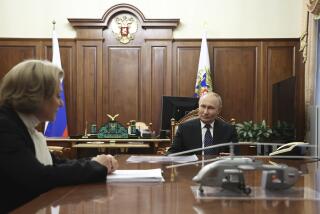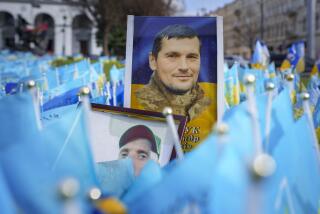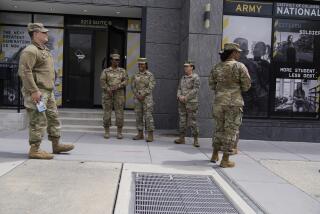Russian Defense Chief Limits Troop Cuts : Military: He reverses policy, drops plan to slash forces. Yeltsin’s position on the issue is unclear.
- Share via
MOSCOW — Russia’s defense minister said Wednesday that the armed forces will keep more than 2 million soldiers and officers in uniform indefinitely, abandoning plans to slash the force to 1.5 million.
Gen. Pavel S. Grachev made the statement in a year-end assessment of the army’s future. He put the current strength at 2.3 million, saying it will be cut to 2.1 million by the end of 1994 and thereafter remain stable.
“We aren’t going to make sharp cuts, we aren’t going to hurry,” Grachev said at a news conference. “We will seek to preserve the number of 2.1 million.”
Military specialists in Moscow said it is unclear whether Grachev was announcing a policy reversal backed by President Boris N. Yeltsin, who is commander in chief of the armed forces, or merely lobbying to head off deeper cuts.
In any case, the general’s remarks indicated that reform of what was once the world’s biggest army will be more sluggish than expected.
Some analysts said that Grachev, perhaps with Yeltsin’s backing, is trying to win back the support of a demoralized army after reports that a large proportion of its ranks voted for Vladimir V. Zhirinovsky’s neo-fascist party in the Dec. 12 parliamentary elections.
“The army proved its potential for disloyalty,” said Andrei V. Kortunov, a political and military analyst at Moscow’s U.S.A.-Canada Institute. “This may be an attempt to recapture Zhirinovsky’s electorate inside the army.”
Except for the Communist Party, the army has lost more power and prestige than any other institution here since the Soviet Union broke up in 1991. Russia inherited an army of 3 million--2 million fewer than the Soviet military machine at its peak--and it has dwindled further through mass draft evasion and resignations of young officers.
Zhirinovsky’s party finished ahead of all 12 rivals in the elections, winning 23% of the nationwide vote on a platform embracing many tenets of fascism, including a policy of military reconquest to restore Russia’s superpower status.
Russian media have reported that Zhirinovsky won far higher support in key military units--72% in the Strategic Missile Forces, which control Russia’s nuclear arsenal, and 87% in the Tamanskaya Division. The latter unit helped Yeltsin crush an October armed revolt by hard-line supporters of the old Soviet-era Parliament that he had dissolved.
After repeated displays of gratitude to the army for its support in that showdown, Yeltsin said last week that he was troubled to hear that one-third of all military personnel had voted for Zhirinovsky.
Grachev, who reportedly had assured Yeltsin that most of the army would support the pro-government Russia’s Choice party, bristled at the press conference when asked about army voting.
He insisted that no such breakdown of returns is available and that the reports are aimed at dividing the army.
“Nobody has the right to create a spirit of discord on political grounds among servicemen,” he said. “The army wants only stability and continuation of reforms.”
Yeltsin and his defense minister were both on record in support of a sharp reduction of the army as part of the broad reform effort aimed at moving Russia’s centralized, militarized economy toward the free market.
The old Parliament had set a ceiling on army personnel--1% of the population, or 1.5 million--and Yeltsin had said that goal would be reached by the year 2000.
But in the weeks since Yeltsin dissolved the old Parliament, Grachev has said that limit is no longer valid. Wednesday was the first time he mentioned a new figure for the army’s desired size.
“An army of 1.5 million isn’t enough for this huge country,” Grachev told reporters. “We are ready to substantiate the figure of 2.1 million before the new Parliament.”
Disputing independent estimates that its current size is in fact closer to 1.5 million, the general said the army has reversed a trend of growing draft evasion and conscripted 60% of its quota last fall.
Grachev said the current military budget covers just one-third of the army’s needs, indicating that he will ask the new Parliament for more money.
Kortunov, the military analyst, said that modernizing the army and maintaining its current size may be incompatible goals, especially if substantial additional funding is not forthcoming.
Moscow Bureau reporter Sergei L. Loiko contributed to this article.
More to Read
Sign up for Essential California
The most important California stories and recommendations in your inbox every morning.
You may occasionally receive promotional content from the Los Angeles Times.













